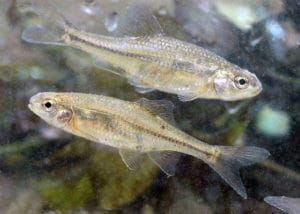

| Online: | |
| Visits: | |
| Stories: |

| Story Views | |
| Now: | |
| Last Hour: | |
| Last 24 Hours: | |
| Total: | |
EPA Denies It, but Pesticides Slow Fish Down
Cornucopia’s Take: One more example of unintended consequences of the widespread use of pesticides as they disperse across the environment and impact non-target species.
Common Pesticide Exposure Alters Behavior of Fish and Amphibians
Beyond Pesticides
 |
Exposure to common pesticides at levels often found in the environment can have subtle but significant impacts on the behavioral health of fish, amphibians and other aquatic invertebrates. According to researchers at Northern Arizona University, who analyzed data from nearly 40 experiments to reach their conclusion, fish and amphibians swam 35% slower and were 72% less active after pesticide exposure.
The study, published in Science of the Total Environment, found that the overall effect on aquatic wildlife varied based on the chemical class the animals encountered. While pyrethroids, carbamates, and organophosphates resulted in a significant decrease in swim speed, triazines and phosphonoglycines showed no overall effect. Pyrethroids, carbamates, organophosphates, organochlorines, and organotins decreased activity, while phosphonoglycines had no overall effect, and triazines actually increased activity. “I didn’t think that we would see [an effect] across such a wide range of pesticides so consistently, but we did,” said study co-author, Catherine Propper, PhD to KNAU, “and that leads to some concerns about environmental exposure for organisms.”
Changes in swim speed and activity level of fish and amphibians can have profound implications for their overall fitness in the environment. Authors of the analysis cite several studies linking specific sublethal pesticide exposures to reduced health outcomes. For example, one study finds reduced activity levels in flathead minnows after exposure to a pyrethroid can result in higher predation and slower growth rates. Salmon exposed to carbamates and organophosphates result in reduced growth, feeding, and size at the time of their migration. Other studies find that pesticide-induced decreases in activity can result in reduced predation on amphibians, but at the cost of reduced growth and delayed development.
The post EPA Denies It, but Pesticides Slow Fish Down appeared first on Cornucopia Institute.
Source: http://www.cornucopia.org/2016/07/epa-denies-pesticides-slow-fish/


